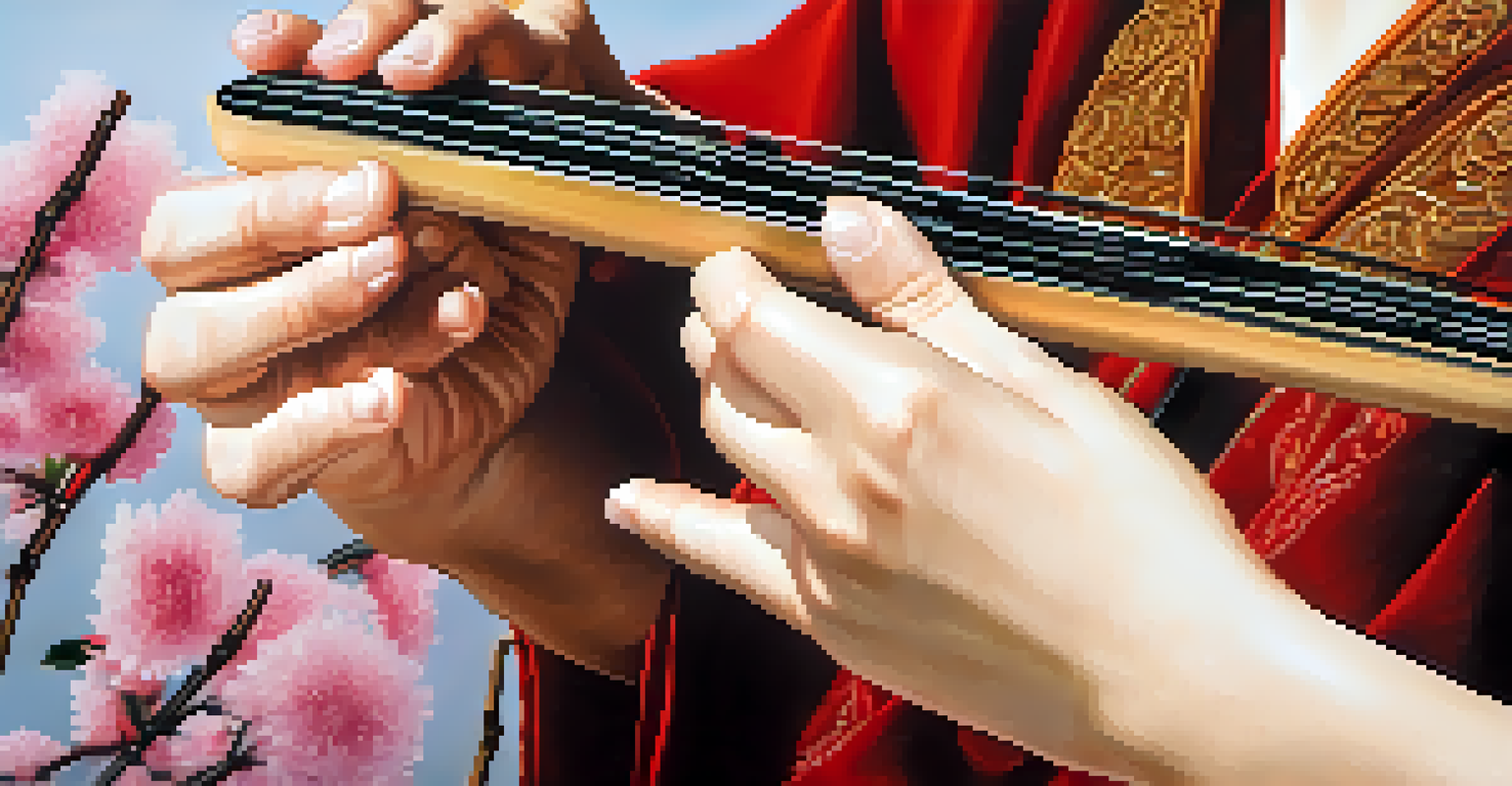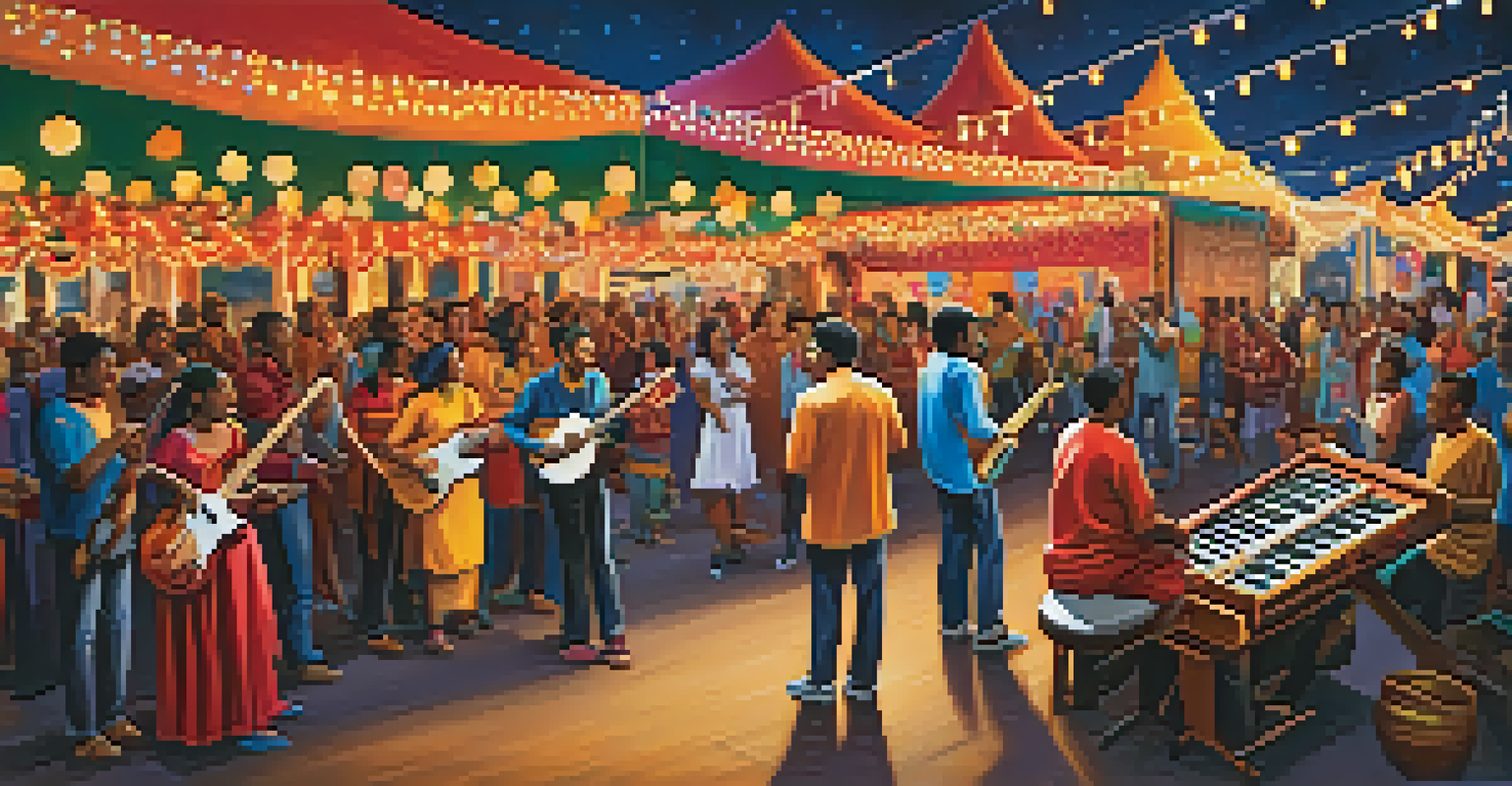Cultural Appropriation in Music Technology: An Ethical Lens

Understanding Cultural Appropriation in Music
Cultural appropriation in music refers to the adoption of elements from one culture by another, often without permission or understanding. This practice can lead to the commercialization of cultural symbols, potentially stripping them of their original meaning. For example, when mainstream artists borrow from Indigenous music without acknowledging its significance, it can feel exploitative to the originating community. Understanding this dynamic sets the stage for deeper discussions about ethics in music technology.
Cultural appropriation is when members of a dominant culture take elements from a culture of people who have been systematically oppressed by that dominant culture.
The issue becomes even more complex when technology is involved, as digital tools allow for easier access to diverse musical traditions. While this democratization of music can be positive, it also raises questions about ownership and respect. We must ask ourselves: Are we appreciating or appropriating? This distinction is vital in fostering a respectful musical landscape.
Ultimately, the goal should be to promote cultural exchange rather than cultural theft. By acknowledging the sources of inspiration, artists can create a more inclusive environment that respects the roots of the music they draw from. This recognition is essential in navigating the music industry's evolving landscape.
The Role of Music Technology in Cultural Exchange
Music technology has revolutionized how we create and share music, opening doors for collaboration across cultures. Platforms like Ableton Live and Pro Tools enable artists from different backgrounds to experiment and innovate together. This collaboration can lead to beautiful fusions of sound, celebrating diversity rather than diluting it. However, this potential comes with the responsibility to engage ethically.

For instance, consider an artist who integrates traditional African drumming into a pop track. If they seek permission from the original drummers and compensate them, this creates a respectful partnership. Such actions can foster genuine cultural exchange, highlighting the importance of collaboration over appropriation.
Cultural Appropriation vs. Appreciation
Understanding the distinction between cultural appreciation and appropriation is crucial for musicians to navigate their creative choices ethically.
By leveraging technology to facilitate respectful interactions, artists can help preserve cultural integrity while pushing creative boundaries. This approach not only enriches the music itself but also strengthens the bonds between different cultures. In this way, music technology can serve as a bridge rather than a barrier.
Ethical Considerations for Musicians and Producers
Musicians and producers must navigate a complex landscape of ethical considerations when drawing from diverse musical traditions. It’s crucial to ask questions about the origins of the sounds they use and the cultural significance behind them. For example, sampling a traditional melody can be a powerful homage or a harmful misstep, depending on the context and intent. Musicians must continuously reflect on their choices and the messages they convey through their art.
Music is a universal language, but it has to be spoken with respect and understanding.
Incorporating ethical practices can involve educating oneself about the cultures they are influenced by. This might mean understanding the historical context or the socio-political struggles of those cultures. By doing so, artists can create music that honors the traditions they borrow from, rather than exploiting them.
Furthermore, transparency in the creative process is vital. When artists openly share their influences and the stories behind their work, they contribute to a culture of respect. This authenticity not only enriches the listening experience but also builds trust between artists and their audiences.
Case Studies: Music Technology and Cultural Appropriation
Analyzing case studies can reveal the nuances of cultural appropriation in music technology. One notable example is the global success of reggaeton, which has roots in Latin American music but has been predominantly popularized by non-Latin artists. While this genre’s rise has introduced a broader audience to its rhythms, it also raises concerns about who gets credit and financial reward for its success.
Another example can be found in hip-hop, where sampling has become a standard practice. Many artists have successfully collaborated with original creators, leading to mutually beneficial relationships. However, there are instances where artists have faced backlash for using samples without permission, highlighting the thin line between homage and theft.
Music Technology and Collaboration
Music technology can facilitate cross-cultural collaborations, but artists must engage ethically to respect the traditions they draw from.
These case studies illustrate the importance of context and intention. They show that while music technology can facilitate cultural exchange, it can also perpetuate inequalities if not approached thoughtfully. By learning from these examples, artists can better navigate their creative choices.
Navigating the Fine Line: Appreciation vs. Appropriation
Distinguishing between appreciation and appropriation can be challenging, especially in the fast-paced world of music technology. Appreciation involves a deep respect and understanding of the cultural elements being used, while appropriation often disregards their significance. Artists should strive to cultivate an awareness of this distinction, as it can significantly impact their work and its reception.
For instance, an artist who incorporates traditional Asian instruments into their music should take the time to learn about their cultural importance. This knowledge not only enriches the music but also demonstrates respect for the culture. By framing their work as a tribute rather than mere imitation, they can foster a more positive dialogue between cultures.
Ultimately, the intention behind an artist's choices plays a crucial role in this discussion. By prioritizing respect and understanding, musicians and producers can navigate the complexities of cultural exchange more ethically. This approach not only enhances their artistry but also contributes to a more inclusive music community.
The Impact of Social Media on Cultural Appropriation
In today's digital age, social media plays a significant role in shaping perceptions of cultural appropriation in music. Platforms like Instagram and TikTok allow artists to share their work instantly, but they also enable audiences to voice their concerns and criticisms. This increased visibility can lead to swift conversations about appropriation, pushing artists to be more mindful of their influences.
For example, when a well-known artist uses elements from a marginalized culture without acknowledgment, social media can amplify backlash quickly. This instant feedback loop serves as a powerful reminder for artists about the potential consequences of their actions. As a result, many are becoming more intentional about the cultural references they include in their work.
Social Media's Impact on Perception
Social media amplifies discussions around cultural appropriation, pushing artists to be more mindful of their influences and actions.
However, while social media can promote awareness, it can also lead to oversimplified narratives. Not every instance of cultural borrowing is appropriation, and artists should navigate these discussions with care. By engaging in thoughtful dialogue, artists can use social media to educate themselves and their followers about the complexities of cultural exchange.
Fostering Ethical Collaboration in Music Technology
To foster ethical collaboration in music technology, artists and producers can implement several best practices. One key strategy is to prioritize inclusivity in their collaborations, ensuring that diverse voices are represented. This could mean partnering with artists from the cultural backgrounds they draw from, creating a more equitable music-making process. By doing so, they can mitigate the risks of appropriation while enriching their music with authentic perspectives.
Another important aspect is to actively seek out and support cultural organizations or initiatives. By collaborating with organizations that promote cultural education and preservation, artists can give back to the communities that inspire them. This not only enhances their credibility but also demonstrates a commitment to ethical practices in the music industry.

Ultimately, fostering ethical collaboration requires ongoing reflection and dialogue. Artists should continuously engage with their communities and seek feedback on their work. This openness can lead to deeper connections and a more respectful approach to cultural exchange, paving the way for a more harmonious music landscape.